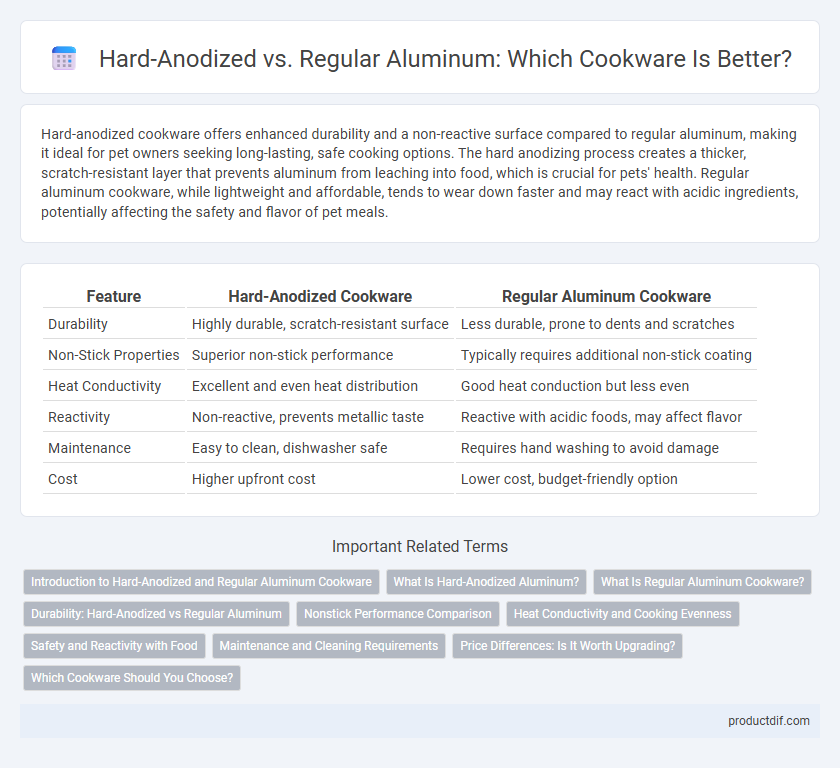Hard-anodized cookware offers enhanced durability and a non-reactive surface compared to regular aluminum, making it ideal for pet owners seeking long-lasting, safe cooking options. The hard anodizing process creates a thicker, scratch-resistant layer that prevents aluminum from leaching into food, which is crucial for pets' health. Regular aluminum cookware, while lightweight and affordable, tends to wear down faster and may react with acidic ingredients, potentially affecting the safety and flavor of pet meals.
Table of Comparison
| Feature | Hard-Anodized Cookware | Regular Aluminum Cookware |
|---|---|---|
| Durability | Highly durable, scratch-resistant surface | Less durable, prone to dents and scratches |
| Non-Stick Properties | Superior non-stick performance | Typically requires additional non-stick coating |
| Heat Conductivity | Excellent and even heat distribution | Good heat conduction but less even |
| Reactivity | Non-reactive, prevents metallic taste | Reactive with acidic foods, may affect flavor |
| Maintenance | Easy to clean, dishwasher safe | Requires hand washing to avoid damage |
| Cost | Higher upfront cost | Lower cost, budget-friendly option |
Introduction to Hard-Anodized and Regular Aluminum Cookware
Hard-anodized cookware features aluminum treated through an electrochemical process that increases durability, corrosion resistance, and surface hardness, making it less prone to scratches and warping. Regular aluminum cookware is lightweight and offers excellent heat conductivity but is softer, more prone to dents, and susceptible to reacting with acidic foods unless coated. Choosing between hard-anodized and regular aluminum cookware depends on durability needs, cooking habits, and maintenance preferences.
What Is Hard-Anodized Aluminum?
Hard-anodized aluminum is aluminum that has undergone an electrochemical process to create a thick, durable oxide layer, enhancing its hardness and corrosion resistance. This non-reactive surface prevents food from sticking and improves the cookware's overall durability compared to regular aluminum. Unlike untreated aluminum, hard-anodized cookware offers superior heat distribution and durability while maintaining lightweight properties.
What Is Regular Aluminum Cookware?
Regular aluminum cookware is made from pure aluminum, known for its excellent heat conductivity and lightweight properties. It heats up quickly but is prone to scratching, warping, and reacting with acidic foods, which can affect taste and durability. This type of cookware often requires seasoning or a nonstick coating to improve performance and longevity.
Durability: Hard-Anodized vs Regular Aluminum
Hard-anodized cookware offers superior durability compared to regular aluminum due to its enhanced surface that resists scratching, warping, and corrosion. The anodization process creates a dense, non-reactive layer, making it more resistant to wear and tear from frequent cooking and cleaning. Regular aluminum cookware, while lightweight and conductive, tends to dent and discolor more easily, resulting in a shorter lifespan under heavy use.
Nonstick Performance Comparison
Hard-anodized cookware features a denser, non-porous surface that provides superior nonstick performance compared to regular aluminum, which tends to have a softer, more reactive surface prone to sticking and degradation. The electrochemical anodization process creates a durable, scratch-resistant layer on hard-anodized pans, enhancing food release and ease of cleaning. Regular aluminum cookware often requires additional nonstick coatings to achieve similar performance but typically lacks the longevity and thermal stability found in hard-anodized options.
Heat Conductivity and Cooking Evenness
Hard-anodized cookware offers superior heat conductivity compared to regular aluminum, ensuring faster and more efficient heat distribution across the cooking surface. This enhanced heat transfer minimizes hot spots, resulting in more even cooking and better overall food quality. Regular aluminum, while lightweight, tends to have less consistent heating, which can cause uneven cooking and potential food burning.
Safety and Reactivity with Food
Hard-anodized cookware features a durable, non-reactive surface resistant to scratching and corrosion, making it safer for cooking acidic foods without leaching aluminum into meals. Regular aluminum pans, while lightweight and conductive, can react with acidic ingredients, potentially altering flavors and causing aluminum to migrate into food, raising health concerns. Hard-anodized aluminum undergoes electrochemical treatment, creating a dense oxide layer that enhances safety by preventing metal exposure and reactivity compared to untreated aluminum cookware.
Maintenance and Cleaning Requirements
Hard-anodized cookware features a non-porous, oxide layer that resists scratching and corrosion, requiring gentle hand washing with mild detergent to preserve its finish. Regular aluminum cookware easily scratches and oxidizes, often necessitating immediate cleaning to prevent discoloration and buildup from acidic foods. Avoiding harsh abrasives and dishwasher use extends the lifespan of hard-anodized surfaces, while regular aluminum may develop patina or stains over time without proper maintenance.
Price Differences: Is It Worth Upgrading?
Hard-anodized cookware typically costs 30% to 50% more than regular aluminum due to its enhanced durability and non-reactive surface. This upgrade offers superior resistance to scratching and corrosion, extending the lifespan and performance of the cookware. For frequent cooks seeking long-term value, the higher initial investment in hard-anodized pans proves cost-effective compared to the lower-priced, less durable regular aluminum options.
Which Cookware Should You Choose?
Hard-anodized cookware offers superior durability and non-reactive surfaces compared to regular aluminum, which can easily scratch and react with acidic foods. The hard-anodizing process creates a dense, corrosion-resistant layer that enhances heat distribution and prevents warping, making it ideal for heavy, frequent use. For those seeking longevity and even cooking with minimal maintenance, hard-anodized cookware is the recommended choice over standard aluminum options.
Hard-Anodized vs Regular Aluminum Infographic

 productdif.com
productdif.com